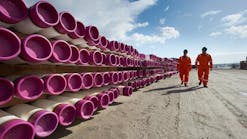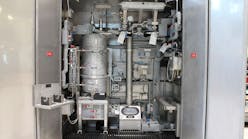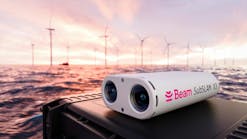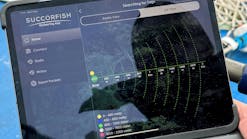Leirvik in the hunt for global aluminum module assignments
Living quarters specialist Leirvik Module Technology (LMT) has recently broken into the Chinese and Brazilian sectors. While the company continues to win work in Norway, it sees success on the international front as vital to its future.
LMT, which switched from shipbuilding to offshore fabrication in 1974, employs a permanent staff of 220 at its yard in Leirvik in western Norway. It has a strong engineering department, with a team of 40 covering all relevant disciplines. The yard is equipped with all facilities needed for module fabrication, including indoor fabrication.
According to business development manager Leif Ståle Lidal, the company has a memorandum of understanding in China with Bomesc - Bohai Oil and Marine Engineering Service Co. The partnership was set up to bid for the living quarter modules for ConocoPhillips’ Penglai 19-3 field development in Bohai Bay, which will include five wellhead platforms with accommodation tied back to a processing FPSO.
The contract, awarded in March, involves one living quarter module weighing 900 tons and a 1,300 ton electrical utility module. There are also single options for each of the other platforms, which will be similarly equipped, the first due to be exercised this summer. Fabrication is taking place at Bomesc’s yard in Tianjin. For the time being, LMT has 12 staff in China providing project management and training services.
China’s hunger for energy should ensure an active offshore sector in that country for many years to come. The need for floaters as finds emerge in waters too deep for fixed platforms is particularly relevant to LMT, Lidal says, as it opens up potential for quarters built in lightweight aluminum. If such a market does develop, he adds, the company would think seriously of investing in an aluminum fabrication operation in China.
LMT is among the most experienced suppliers of aluminum quarters. In fact, it built the first such module, for Saga’s Snorre A platform, delivered in 1991.
GoM certification
The company’s assignment in Brazil involves supporting the Keppel FELS do Brasil yard in provision of aluminum living quarters for Petrobras’P-52 FPSO. In mid year, LMT was finalizing the structural and fire protection engineering for the module, which will weigh around 2,000 tons and have 198 beds. It has also supplied 100 tons of aluminum beams for the module.
LMT does not have a fixed partner in Brazil, but it does in the US. In 2001, together with Popham Walter Architects, which specializes in living quarters design, it established Leirvik Quarters Inc. The main aim of this joint venture is to promote the use of aluminum in GoM projects. It spent a demanding 18 months getting certification for the use of aluminum offshore from the American Bureau of Shipping, and is now the only company with US Coast Guard approval for such applications.
A second joint venture in the US is Leirvik Beacon Offshore, established by Leirvik Quarters Inc and Beacon Maritime, which has a fabrication yard in Orange, Texas. In mid year, bids had been submitted for several GoM projects, including some offering both steel and aluminum. Another target for the joint venture could be Mediterranean projects, including offshore LNG receiving terminals. The weak state of the US dollar gives US exporters a competitive edge, Lidal says.
LMT’s international reference list also includes the supply of two living quarters, each weighing around 600 tons, for ChevronTexaco’s Dibi and Delta projects off Nigeria. Nigerian engineers underwent training at the company’s yard in Norway where construction took place.
In the North Sea, LMT has won a string of orders for additional accommodation facilities on existing platforms. It has supplied additional modules for Norsk Hydro’s Oseberg East and Troll C platforms and Statoil’s Visund and Kvitebjørn, and is now building an additional quarters module for Statoil’s Huldra. Except for Huldra, all these units are in aluminum as minimal weight is a requirement.
Traditionally aluminum has been more expensive than steel, but with the recent increase in steel prices, the cost gap has closed significantly, Lidal says. Aluminum is also attractive if rapid delivery is required, as it can be procured faster, and aluminum structures take less time to fabricate than steel ones.
The company also has its eye on upcoming new developments in the UK and Norway sectors. LMT supplied the living quarter and utility modules for BP’s Clair development. Second and third phases of Clair are under review, while in the Norwegian sector bid invites are expected next year for BP’s new Valhall platform. The Valhall quarters will require 150 beds, and would weigh in at around 1,300 tons in steel or 1,000 tons in aluminum.
It is likely to be based on single cabins, as the signs are this will become mandatory offshore Norway within a few years. Elsewhere in the Norwegian sector, ConocoPhillips is planning a new hotel platform on Ekofisk, and considering a new one for Eldfisk.•






